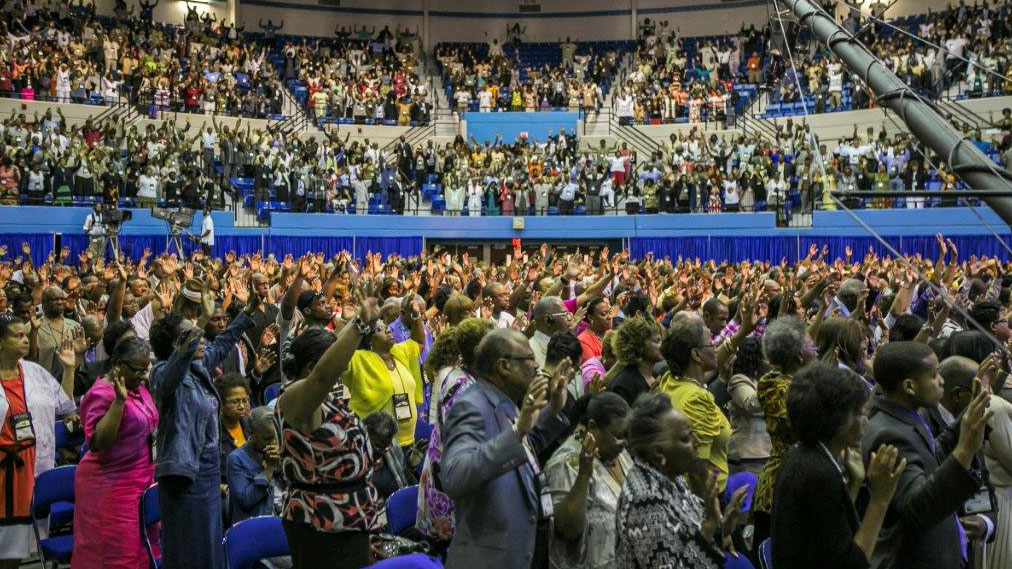Yesterday I saw a doctrine. I'm at the annual Hampton University Ministers' Conference in Virginia, which is celebrating its 100th anniversary. This year it gathers some 8,000 African American bishops, pastors, "first ladies," music directors, and assorted church leaders for mutual encouragement and inspiration. These brothers and sisters love to "do church," which means (among other things) getting heart, mind, soul, and body involved in worship.
Black preachers begin not merely assuming the illumination of the Spirit, but almost demanding it.
It also means they take seriously the doctrine of the illumination of Scripture. That doctrine reminds us that before we can grasp—with heart and mind—the meaning of any given passage of Scripture, the Holy Spirit has to illumine us. For introspective types like me, that means experiencing a lucid moment, quiet and inward, of insight or inspiration. Not so for my black friends.
They begin preaching not merely assuming the illumination of the Spirit, but almost demanding it. They read the text, massage the text, and, as one seminar leader put it, make love to the text. Their cadences roll like an ever living stream, from a trickle to a roaring waterfall. Black preachers assume that the full range of emotions need to be elicited if we're going to understand a text. By the time the preacher is through, the congregation is alive, hands are raised, bodies are dancing, voices are lifted in praise.
The expectation of illumination is so powerful in black worship, it can happen spontaneously. One preacher, James Forbes, asked someone from the audience to read the text he wanted to preach on. A woman stood, and as loudly as she could in the vast arena, read from Exodus 15, with Forbes repeating each phrase from his microphone. She wound her way to verse 26—"for I am the Lord that healeth thee." She barely finished the sentence when she shouted out in praise and began gyrating in joy in her place. She not only understood, she grasped with her whole being the promise of that verse. The illumination of the Holy Spirit.
There's another type of illumination that's important, too. The illumination of our ignorance.
I think the doctrine of the illumination of Scripture should be expanded to the illumination of doctrine. It happens when you leave home and visit another tradition in the magnificent quilt called Christianity, and you see a doctrine and realize, perhaps for the first time, it's more true than you had imagined.
But there's another type of illumination that's important, too. The illumination of our ignorance.
Not Getting It
Being one of the very few white people in a sea of 8,000 black faces, one would think I'd feel intimidated in such a crowd, that I'd finally understand what it's like to be the minority. That's one point of a white man going to such a conference, no?
Not quite. When I walk into this setting, I walk in as a white man of privilege. I come with a full backpack of inherited power and wealth and influence, and thus privilege is embedded deep within me. I can't possibly leave it at the front door. Even in that sea of black faces, I don't feel intimidated or particularly shy. That's partly because of the warm greetings I received everywhere I go. (I don't know if it's Southern or African American hospitality, but it sure is nice.) But hospitality or not, because of my social location and privilege, I don't think I'll ever be illumined when it comes to feeling like an oppressed minority.
Reading the recent Atlantic cover story, "The Case for Reparations," does wonders for helping someone like me grasp afresh the injustice and suffering America has inflicted on our black brothers and sisters. I can understand that reality, and as a human being who has endured some measure of suffering, even empathize at some level. But fundamentally, I'm a man with a completely different experience of life. I can't possibly understand what it's like to be a black man in America. And that's a good thing.
I don't get it. I'll never get it. Which is precisely why I continue to need—desperately need—to stay in fellowship with "the other."
The ecumenical work we're called to—to show forth the unity of the body of Christ (John 17; Eph. 4)—does not mean I should try to grasp the world from the perspective of "the other." It does not mean to walk a mile in another person's shoes. That, I believe, is impossible. Instead, I think it means grasping that I cannot grasp it. If I can grasp it, I no longer need the "other"; if I grasp it, I get it, and if I get it, I can move on with this new illumination firmly embedded within.
No, I don't get it. I'll never get it. Which is precisely why I continue to need—desperately need—to stay in fellowship with my black brothers and sisters. And everyone else who is an "other"—Catholics, Pentecostals, Holiness folks, Baptists, not to mention Hispanics, Asian Ameircans, and that most mysterious creation called women. And so forth. We need each other not so we can understand each other, but precisely because we don't. Not because we can become compatible, but precisely because we're not. I need the "other" precisely to remember that they are an "other" and as such, a distinct and unique grace of God, someone with whom I can have genuine fellowship with—not a melding, but a fellowship of persons, each with their own gifts that the other needs.
Again, we get back to the beautiful taspestry of the faith, which allows me to enjoy not just glorious moments when I grasp as never before something true about the faith, but quiet moments when I realize I will never understand some things, that much will remain forever a mystery to me. And both are a work of the illumination of the Spirit, no?
Mark Galli is editor of Christianity Today.









